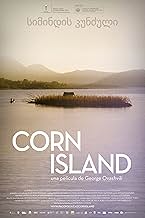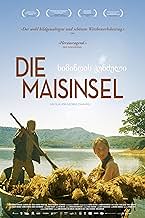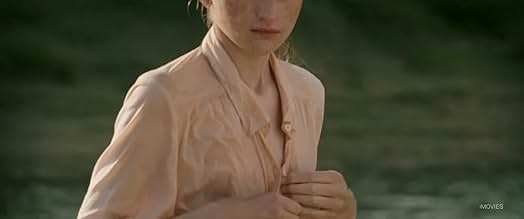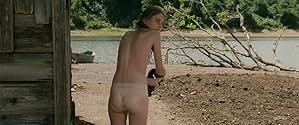VALUTAZIONE IMDb
7,4/10
4802
LA TUA VALUTAZIONE
Il fiume crea e il fiume distrugge, in un ciclo eterno a cui neanche gli uomini possono sottrarsi.Il fiume crea e il fiume distrugge, in un ciclo eterno a cui neanche gli uomini possono sottrarsi.Il fiume crea e il fiume distrugge, in un ciclo eterno a cui neanche gli uomini possono sottrarsi.
- Regia
- Sceneggiatura
- Star
- Premi
- 23 vittorie e 12 candidature totali
Recensioni in evidenza
One of the main goals of art film is to depict life in its most pure, elemental state. Yet few art movies have managed to achieve that goal with as much grace and poetic depth as George Ovashivili's Corn Island. This immaculately composed film takes the viewers on a soul-touching journey into the desolate, breathtakingly beautiful wilderness of a small island in Georgia and perfectly captures the rhythm of nature and the relation between nature and the two main characters whose daily struggles are interweaved into the light, sound and motion of nature around them. Throughout the film, the viewer can't help but feel the life-like, natural quality of every picture and scene. There are no excessive details; everything is distilled into its most natural state. The image of the old man's granddaughter sitting on the boat with a bundle of shining reed under the crisp sunlight is a precise portrait of life itself. In essence, art has blended into life, and life into art. What is more remarkable is that the director has managed to convey this profound state of life without the help of dialogue. Perhaps one could argue that it is precisely the lack of dialogue that has made this film that much more powerful and moving. A scene in the beginning where the old man fondly looks at a little bird pecking at the wood conveys a sense of elegance that no language can easily convey. Even the intermittent gunshots we hear in the background and the discovery of a wounded soldier that temporarily disrupts the tranquility of the island do not lead the film to deviate from its original artistic path. On the contrary, the tension lurking in the background elevates the humanistic aspect of the film to a new height. In the end, every human gesture and activity is dissolved into the larger nature. What we are left with is a film that touches the depth of our soul with such simplicity and gracefulness that very few films can match.
Every year the Enguri River drops to reveal small fertile islands. Because the river marks the natural border that separates Georgia from Abkhazia, these islands are unclaimed territory. Peasants come every year to live on them during the growing season, attempting to harvest enough corn to survive the winter. Two problems face them; the fact that the two nations have been in some form of conflict since the 90's and the rising waters of the Enguri.
Clearly influenced by the likes of Dreyer and Bela Tarr, Director George Ovashvili's slow-burning, minimalist thriller takes place entirely on and around one of these tiny islands. We follow an old man, referred to only as Grandpa, and his grand-daughter as they methodically bring supplies to the island and construct a small shack. They will have to live on this island in order to tend to and protect their little patch of corn.
The film is low on plot and with nearly no dialogue and yet the sweeping cinematography gives the film an epic tone. This island means everything and nothing. The river creates and the river destroys. The island is a microcosm of man against nature, of the political instability of the region and of life itself. The amount Corn Island is able to achieve with so little is commendable.
A grand achievement, Corn Island hints at a bright future for Georgian cinema and puts George Ovashvili on the radar as a director to watch.
Clearly influenced by the likes of Dreyer and Bela Tarr, Director George Ovashvili's slow-burning, minimalist thriller takes place entirely on and around one of these tiny islands. We follow an old man, referred to only as Grandpa, and his grand-daughter as they methodically bring supplies to the island and construct a small shack. They will have to live on this island in order to tend to and protect their little patch of corn.
The film is low on plot and with nearly no dialogue and yet the sweeping cinematography gives the film an epic tone. This island means everything and nothing. The river creates and the river destroys. The island is a microcosm of man against nature, of the political instability of the region and of life itself. The amount Corn Island is able to achieve with so little is commendable.
A grand achievement, Corn Island hints at a bright future for Georgian cinema and puts George Ovashvili on the radar as a director to watch.
As a review, I wouldn't go much into detail since the movie itself is minimal in most of the sense but if you are nature loving slow paced artistic movie fan, You will surely love this movie.
Although movie present post-war conflict between two nations, there's hardly any dynamics in visually or audibly.Simple story narration, An old man and his grand daughter find themselves in a small island temporarily formed by river and cultivate corn.
Director portray entire procedure in growing a corn plants which might feel a bit slow but the breezy tone of the cinematography makes the movie intellectually engaging This is a thought provoking beautifully executed art piece.
Although movie present post-war conflict between two nations, there's hardly any dynamics in visually or audibly.Simple story narration, An old man and his grand daughter find themselves in a small island temporarily formed by river and cultivate corn.
Director portray entire procedure in growing a corn plants which might feel a bit slow but the breezy tone of the cinematography makes the movie intellectually engaging This is a thought provoking beautifully executed art piece.
Every year, the level of the Enguri River drops to uncover islands with fertile river-bottom soil. Locals can temporarily claim these islands for a season to grow a subsistence crop. An old man with one oar in an old wooden boat slowly makes his way to just such an island. He paces it off, digs the earth, tastes the soil, decides it will do, and marks his claim with a scrap of cloth on a stick. He leaves and then returns again and again, bringing supplies including scrap lumber to build a cabin with a thatched roof and then to plant corn with the help of his granddaughter who's in her early adolescence. Almost no words are spoken.
A big part of this film is thus man versus nature. Will nature allow the old man and his granddaughter to scratch a living from this transient plot of land? This part of the film might as well be prehistoric because it's so primitive. Intentionally so.
There's another part of the film caused by the island's location: in no-man's land between the warring country of Georgia and Abkhazia, a breakaway territory. This off-screen conflict brings soldiers from both sides into the film and we have man versus man versus man.
The film takes its time in all things. It's slaved to nature's pace and the growing corn. Things unfold slowly. Some of them aren't explained. That's the way it is in real life.
If you like artistic films with beautiful cinematography, this is a film for you. If you're looking for complex ideas and twisted plots, look elsewhere. This is a primal film about conflicts in nature, conflicts between men.
A big part of this film is thus man versus nature. Will nature allow the old man and his granddaughter to scratch a living from this transient plot of land? This part of the film might as well be prehistoric because it's so primitive. Intentionally so.
There's another part of the film caused by the island's location: in no-man's land between the warring country of Georgia and Abkhazia, a breakaway territory. This off-screen conflict brings soldiers from both sides into the film and we have man versus man versus man.
The film takes its time in all things. It's slaved to nature's pace and the growing corn. Things unfold slowly. Some of them aren't explained. That's the way it is in real life.
If you like artistic films with beautiful cinematography, this is a film for you. If you're looking for complex ideas and twisted plots, look elsewhere. This is a primal film about conflicts in nature, conflicts between men.
"Corn island" is about islands that run dry in early spring and are swallowed up by the river again during winter. In the meantime it is very fertile land and farmers from the neigbourhood are keen to occupy such an island in order to sow and harvest corn.
From the above description it is clear that "Corn island" is a slow movie about a slow and peaceful live. You can nearly see the corn crow. This slow and peaceful live however is disrupted in multiple ways.
In the first place is the corn island of this movie situated in a disputed territory between two countries. Rival soldiers are regularly passing by the island. The farmer is determined to stay out of this war. Will he succeed? This aspect of the film reminded me of the Dutch novel "The house of refuge" (1952, Willem Frederik Hermans).
A farmers live is always governed by the seasons, but that is especially true if your field is on a temporary island. The second cause of disruption.
Not only the corn is growing, but also the granddaughter of the farmer. This fact does not pass unnoticed by the passing soldiers, forming the third disruptive force. This third aspect of the film is in my opinion the weakest. The coming of age is portrayed using a lot of clichés such as suddenly being tired of your favorite doll or experiencing the first menstrual cycle.
After "In bloom" (2013, Nana Ekvtimishvili) "Corn island" was the second film from Georgia I saw within a year. Remarkable was the large share that the grandparents had in both films in raising their grandchildren. A coincidence?
From the above description it is clear that "Corn island" is a slow movie about a slow and peaceful live. You can nearly see the corn crow. This slow and peaceful live however is disrupted in multiple ways.
In the first place is the corn island of this movie situated in a disputed territory between two countries. Rival soldiers are regularly passing by the island. The farmer is determined to stay out of this war. Will he succeed? This aspect of the film reminded me of the Dutch novel "The house of refuge" (1952, Willem Frederik Hermans).
A farmers live is always governed by the seasons, but that is especially true if your field is on a temporary island. The second cause of disruption.
Not only the corn is growing, but also the granddaughter of the farmer. This fact does not pass unnoticed by the passing soldiers, forming the third disruptive force. This third aspect of the film is in my opinion the weakest. The coming of age is portrayed using a lot of clichés such as suddenly being tired of your favorite doll or experiencing the first menstrual cycle.
After "In bloom" (2013, Nana Ekvtimishvili) "Corn island" was the second film from Georgia I saw within a year. Remarkable was the large share that the grandparents had in both films in raising their grandchildren. A coincidence?
Lo sapevi?
- QuizIn order to find the location for this movie, the filmmakers had been looking for a real island for two years. Eventually, they realised it would be too complicated and too dangerous to film on such a place. Instead, they built the island on an artificial lake, where they could control the water level to some extent, director George Ovashvili revealed in an interview.
- ConnessioniReferenced in CT na MFF Karlovy Vary 2017: Generální reditel Petr Dvorák (2017)
I più visti
Accedi per valutare e creare un elenco di titoli salvati per ottenere consigli personalizzati
- How long is Corn Island?Powered by Alexa
Dettagli
- Data di uscita
- Paesi di origine
- Sito ufficiale
- Lingue
- Celebre anche come
- Simindis kundzuli
- Luoghi delle riprese
- Aziende produttrici
- Vedi altri crediti dell’azienda su IMDbPro
Botteghino
- Budget
- 1.500.000 € (previsto)
- Lordo in tutto il mondo
- 37.445 USD
Contribuisci a questa pagina
Suggerisci una modifica o aggiungi i contenuti mancanti























